DO-IT Webinars
Following is a list of archived webinars provided since 2018 as part of the AccessADVANCE, AccessComputing, AccessCSforAll, AccessINCLUDES, ADEPT, AiiCE, and NNL projects.
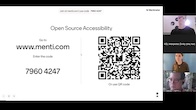 Aug 26, 2025Ed Summers and Maria Lamardo of GitHubSupported by: AiiCEGiven that technology is a ubiquitous and essential part of modern life, and approximately 16% of the human population have a disability, it is critical that people with disabilities are able to contribute to the development of the technology that is used by all. The challenge is that proprietary Assistive Technology products can be very expensive, and people with disabilities are unemployed or under-employed at higher levels than the general population so open-source assistive technology is imperative. This webinar will share information on how GitHub is working to make that happen.
Aug 26, 2025Ed Summers and Maria Lamardo of GitHubSupported by: AiiCEGiven that technology is a ubiquitous and essential part of modern life, and approximately 16% of the human population have a disability, it is critical that people with disabilities are able to contribute to the development of the technology that is used by all. The challenge is that proprietary Assistive Technology products can be very expensive, and people with disabilities are unemployed or under-employed at higher levels than the general population so open-source assistive technology is imperative. This webinar will share information on how GitHub is working to make that happen.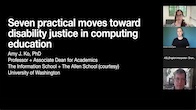 Jul 14, 2025Amy J. Ko, University of WashingtonSupported by: AccessComputingAmy will discuss how, employing a disability justice lens and embracing its intersections with other systems of oppression around race, gender, and class, she strives to apply a Universal Design in Learning (UDL) framework to her teaching. She'll share her philosophy on UDL and share 7 heuristics she has developed for accessible teaching in computing. NOTE: Due to Zoom-related screen-sharing in the first several minutes of the presentation, the presenter's first two slides have been statically laid over the screen share, and discussion between the presenter and host regarding tech difficulties interrupt the presentation briefly around the 00:05:45 mark.
Jul 14, 2025Amy J. Ko, University of WashingtonSupported by: AccessComputingAmy will discuss how, employing a disability justice lens and embracing its intersections with other systems of oppression around race, gender, and class, she strives to apply a Universal Design in Learning (UDL) framework to her teaching. She'll share her philosophy on UDL and share 7 heuristics she has developed for accessible teaching in computing. NOTE: Due to Zoom-related screen-sharing in the first several minutes of the presentation, the presenter's first two slides have been statically laid over the screen share, and discussion between the presenter and host regarding tech difficulties interrupt the presentation briefly around the 00:05:45 mark.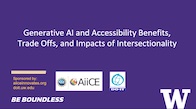 Jun 23, 2025Kate Glazko, University of Washington; Jun Cha, University of Wisconsin; and Sev Huffman, Gallaudet University & University of WashingtonSupported by: AiiCEResearchers present findings on the the benefits, trades offs and impacts of using Generative AI for accessibility by members of the Deaf/HoH communities and Neurodivergent individuals. In the first, Glazko & Cha, et. al., discuss how neurodivergent people, often left out by existing accessibility technologies, develop their own ways of navigating normative expectations. GAI offers new opportunities for access, but it is important to understand how neurodivergent “power users”—successful early adopters—engage with it and the challenges they face. In the second one, Huffman, et. al., discuss Generative AI tools, particularly those utilizing large language models (LLMs), and how they are increasingly used in everyday contexts. While these tools enhance productivity and accessibility, little is known about how Deaf and Hard of Hearing (DHH) individuals engage with them or the challenges they face when using them.
Jun 23, 2025Kate Glazko, University of Washington; Jun Cha, University of Wisconsin; and Sev Huffman, Gallaudet University & University of WashingtonSupported by: AiiCEResearchers present findings on the the benefits, trades offs and impacts of using Generative AI for accessibility by members of the Deaf/HoH communities and Neurodivergent individuals. In the first, Glazko & Cha, et. al., discuss how neurodivergent people, often left out by existing accessibility technologies, develop their own ways of navigating normative expectations. GAI offers new opportunities for access, but it is important to understand how neurodivergent “power users”—successful early adopters—engage with it and the challenges they face. In the second one, Huffman, et. al., discuss Generative AI tools, particularly those utilizing large language models (LLMs), and how they are increasingly used in everyday contexts. While these tools enhance productivity and accessibility, little is known about how Deaf and Hard of Hearing (DHH) individuals engage with them or the challenges they face when using them.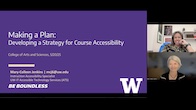 May 20, 2025Mary-Colleen Jenkins, UW ATSSupported by:In this workshop, after establishing a shared understanding of digital accessibility, Mary-Colleen addresses a key question faculty ask when creating a plan to make their content accessible: Where should I start? She helps participants establish a starting point in three steps: an informal audit of tools and workflow; thinking about the "First Next Thing;" and setting up a cleaner, leaner Canvas Course. During three guided activity sessions participants taking the time to reflect on where they are starting from as a way to start developing a workable accessibility plan for their content. Finally, she shared tips on how to prioritize content to focus on first.
May 20, 2025Mary-Colleen Jenkins, UW ATSSupported by:In this workshop, after establishing a shared understanding of digital accessibility, Mary-Colleen addresses a key question faculty ask when creating a plan to make their content accessible: Where should I start? She helps participants establish a starting point in three steps: an informal audit of tools and workflow; thinking about the "First Next Thing;" and setting up a cleaner, leaner Canvas Course. During three guided activity sessions participants taking the time to reflect on where they are starting from as a way to start developing a workable accessibility plan for their content. Finally, she shared tips on how to prioritize content to focus on first.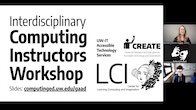 May 15, 2025Kevin Lin, UW Allen School; Amy J. Ko, UW iSchool; Mary-Colleen Jenkins, UW-IT ATS; Miya Natsuhara, UW Allen School; Matt Wang, UW Allen School; Ritesh Kanchi, UW Allen School.Supported by: AccessComputingIn this Global Accessibility Awareness Day workshop facilitated by UW teaching faculty, participants connected and learned strategies for making computing courses more compliant with the new ADA 2026 digital accessibility requirements. Tutorials and discussion breakouts were not recorded. Recorded sections in this video: Introduction with Kevin Lin; Shareout from Breakout Discussion #1; "Seven Practical Moves Toward Disability Justice in Computing Education" keynote presentation by Amy J. Ko, PhD (start at 14:27); Resources and Closing Comments.
May 15, 2025Kevin Lin, UW Allen School; Amy J. Ko, UW iSchool; Mary-Colleen Jenkins, UW-IT ATS; Miya Natsuhara, UW Allen School; Matt Wang, UW Allen School; Ritesh Kanchi, UW Allen School.Supported by: AccessComputingIn this Global Accessibility Awareness Day workshop facilitated by UW teaching faculty, participants connected and learned strategies for making computing courses more compliant with the new ADA 2026 digital accessibility requirements. Tutorials and discussion breakouts were not recorded. Recorded sections in this video: Introduction with Kevin Lin; Shareout from Breakout Discussion #1; "Seven Practical Moves Toward Disability Justice in Computing Education" keynote presentation by Amy J. Ko, PhD (start at 14:27); Resources and Closing Comments.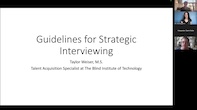 May 09, 2025Tayler Weiser, Blind Institute of TechnologySupported by: AccessComputingLearn how to strategically prepare for interviews, based on the company profile, the position description and your education, experience and skill set.
May 09, 2025Tayler Weiser, Blind Institute of TechnologySupported by: AccessComputingLearn how to strategically prepare for interviews, based on the company profile, the position description and your education, experience and skill set.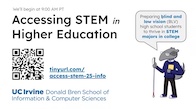 May 03, 2025Stacy Branham, UC-Irvine and Nicholas Guidice, University of MaineSupported by: AccessComputingThe 2025 UC Irvine "Accessing STEM and Higher Education" event focused on making higher education more accessible to students with disabilities, particularly those who are blind or have low vision. Professor Stacy Branham shared her journey in accessible technology and highlighted the lack of digital accessibility courses in computer science programs. Dr. Nicholas Giudice emphasized the importance of time management, self-advocacy, and involvement in the design of accessible technology for blind students in STEM. Panelists discussed their preferred methods for representing math equations, shared experiences with accommodations and emphasized self-advocacy, independence, and the value of community support.
May 03, 2025Stacy Branham, UC-Irvine and Nicholas Guidice, University of MaineSupported by: AccessComputingThe 2025 UC Irvine "Accessing STEM and Higher Education" event focused on making higher education more accessible to students with disabilities, particularly those who are blind or have low vision. Professor Stacy Branham shared her journey in accessible technology and highlighted the lack of digital accessibility courses in computer science programs. Dr. Nicholas Giudice emphasized the importance of time management, self-advocacy, and involvement in the design of accessible technology for blind students in STEM. Panelists discussed their preferred methods for representing math equations, shared experiences with accommodations and emphasized self-advocacy, independence, and the value of community support.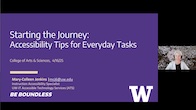 Apr 16, 2025Mary-Colleen Jenkins, UW ATSSupported by:In this workshop, Mary-Colleen establishes a shared understanding of digital accessibility. She reviews three key accessibility skills that can be applied when creating word documents, Canvas pages, slide decks, and other types of content. During three activity sessions participants practiced these skills on their own content. Finally, she shared the mindset of "Progress over Perfection."
Apr 16, 2025Mary-Colleen Jenkins, UW ATSSupported by:In this workshop, Mary-Colleen establishes a shared understanding of digital accessibility. She reviews three key accessibility skills that can be applied when creating word documents, Canvas pages, slide decks, and other types of content. During three activity sessions participants practiced these skills on their own content. Finally, she shared the mindset of "Progress over Perfection."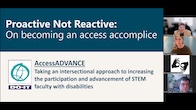 Mar 18, 2025Kate Mittendorf, PhD, Vanderbilt University Medical SchoolSupported by: AccessADVANCEDr. Mittendorf provides a historical overview of models of disability, specifically examining their impact on the treatment of disability within academia and related fields. They explored the conflict of current approaches to disability accommodation with disability liberation, specifically examining ableism within academic culture. They then discussed the necessity of incorporating the embodied expertise of disabled persons and disability communities into approaches to disability liberation. Finally, they provided readily actionable strategies for reimagining disability access in academia and related fields.
Mar 18, 2025Kate Mittendorf, PhD, Vanderbilt University Medical SchoolSupported by: AccessADVANCEDr. Mittendorf provides a historical overview of models of disability, specifically examining their impact on the treatment of disability within academia and related fields. They explored the conflict of current approaches to disability accommodation with disability liberation, specifically examining ableism within academic culture. They then discussed the necessity of incorporating the embodied expertise of disabled persons and disability communities into approaches to disability liberation. Finally, they provided readily actionable strategies for reimagining disability access in academia and related fields.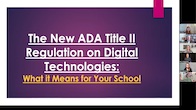 Mar 13, 2025Eve Hill, JD, Brown, Goldstein & Levy, LLPSupported by: AccessComputingEve Hill explains the Department of Justice’s new ADA Title II regulation requiring websites and digital offerings of state & local governments as well as public institutions of higher education to comply with the Web Content Accessibility Guidelines 2.1 Level AA. She addresses the general rule and its exceptions; she also discussed how institutions of higher education can best be prepared for compliance with the rule when it goes into effect in 2026.
Mar 13, 2025Eve Hill, JD, Brown, Goldstein & Levy, LLPSupported by: AccessComputingEve Hill explains the Department of Justice’s new ADA Title II regulation requiring websites and digital offerings of state & local governments as well as public institutions of higher education to comply with the Web Content Accessibility Guidelines 2.1 Level AA. She addresses the general rule and its exceptions; she also discussed how institutions of higher education can best be prepared for compliance with the rule when it goes into effect in 2026.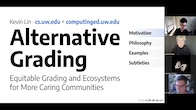 Feb 11, 2025Kevin Lin, UW Paul G. Allen School of Computer Science and EngineeringSupported by: AiiCEMr. Lin shared his experiences as an assistant teaching professor with alternative grading practices that better represent the learning that students achieve over time, producing more equitable outcomes by changing the way we determine final grades. He talked about the potential alternative grading has to empower students by making space for creative student work that might not otherwise thrive in a points-based grading ecosystem. He suggested that grading policies on their own often aren’t enough—at least not in the grade-focused culture at many institutions—so he also shared some of the challenges he's faced and how he works toward better relationships between students, educators, and grades. Note: This recording was edited at the 53:30 mark to reduce static and to remove an extended pause.
Feb 11, 2025Kevin Lin, UW Paul G. Allen School of Computer Science and EngineeringSupported by: AiiCEMr. Lin shared his experiences as an assistant teaching professor with alternative grading practices that better represent the learning that students achieve over time, producing more equitable outcomes by changing the way we determine final grades. He talked about the potential alternative grading has to empower students by making space for creative student work that might not otherwise thrive in a points-based grading ecosystem. He suggested that grading policies on their own often aren’t enough—at least not in the grade-focused culture at many institutions—so he also shared some of the challenges he's faced and how he works toward better relationships between students, educators, and grades. Note: This recording was edited at the 53:30 mark to reduce static and to remove an extended pause.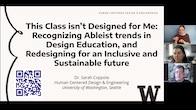 Jan 28, 2025Sarah Coppola, PhD, UW Allen SchoolSupported by: AccessComputingTraditional and currently prevalent pedagogies of design perpetuate ableist and exclusionary notions of what it means to be a designer. In this session, Dr. Coppola will give a brief overview of historically exclusionary norms of design education and highlight modern-day instances of her own experience as a design educator in such epistemologies. Coppola will lead us in imagining a more inclusive and sustainable future of design education and present case studies from personal experience in redesigning course experiences for students with disabilities.
Jan 28, 2025Sarah Coppola, PhD, UW Allen SchoolSupported by: AccessComputingTraditional and currently prevalent pedagogies of design perpetuate ableist and exclusionary notions of what it means to be a designer. In this session, Dr. Coppola will give a brief overview of historically exclusionary norms of design education and highlight modern-day instances of her own experience as a design educator in such epistemologies. Coppola will lead us in imagining a more inclusive and sustainable future of design education and present case studies from personal experience in redesigning course experiences for students with disabilities.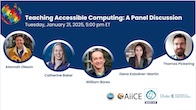 Jan 21, 2025Moderator: Dr. Alannah Oleson. Panelists: Dr. Catherine Baker; Dr. William Bares; Dr. Elena Kalodner-Martin; Dr. Thomas PickeringSupported by: AiiCEWithout explicitly learning to develop accessible technology, technologists are entering the workforce without the ability to produce technology that is accessible to people with disabilities. This in turn limits the ability of companies and organizations to design accessible technology. The new resource book, Teaching Accessible Computing (TAC), offers concrete pedagogical ideas for educators about how to integrate accessibility into their computer science classes. This panel discussion of authors will highlight the inclusion of accessibility in various aspects of computing curriculum.
Jan 21, 2025Moderator: Dr. Alannah Oleson. Panelists: Dr. Catherine Baker; Dr. William Bares; Dr. Elena Kalodner-Martin; Dr. Thomas PickeringSupported by: AiiCEWithout explicitly learning to develop accessible technology, technologists are entering the workforce without the ability to produce technology that is accessible to people with disabilities. This in turn limits the ability of companies and organizations to design accessible technology. The new resource book, Teaching Accessible Computing (TAC), offers concrete pedagogical ideas for educators about how to integrate accessibility into their computer science classes. This panel discussion of authors will highlight the inclusion of accessibility in various aspects of computing curriculum.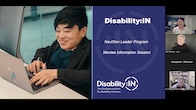 Dec 05, 2024Alyse Erickson Coordinator for NextGen Initiatives with Disability:INSupported by: AccessComputingNextGen Leaders are college students and recent graduates with disabilities, including veterans, who represent sought after talent by Disability:IN’s 550+ Corporate Partner companies. NextGen Leaders have the opportunity to connect with leading brands across all industries, and are matched one-on-one with mentors from Disability:IN Corporate Partners for a six-month virtual mentoring relationship that also includes opportunities to connect and network with recruiters from leading companies like Wells Fargo, T-Mobile, Microsoft, Walmart and more! (This video has been edited, removing personal identifying information from the participants).
Dec 05, 2024Alyse Erickson Coordinator for NextGen Initiatives with Disability:INSupported by: AccessComputingNextGen Leaders are college students and recent graduates with disabilities, including veterans, who represent sought after talent by Disability:IN’s 550+ Corporate Partner companies. NextGen Leaders have the opportunity to connect with leading brands across all industries, and are matched one-on-one with mentors from Disability:IN Corporate Partners for a six-month virtual mentoring relationship that also includes opportunities to connect and network with recruiters from leading companies like Wells Fargo, T-Mobile, Microsoft, Walmart and more! (This video has been edited, removing personal identifying information from the participants).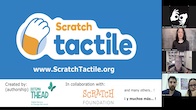 Dec 04, 2024Roger Olivella & Maria Seoane, co-founders of Sistema THEADSupported by: AccessCSforAllScratch Tactile is more than a resource — it's a community and movement dedicated to equity, inclusion, and digital accessibility in classrooms. Designed with Universal Design for Learning in mind, these tangible programming blocks allow *all* students to learn together, creating an inclusive environment for everyone. Originally developed for blind and low vision students, Scratch Tactile has been refined through testing with over 200 diverse learners to ensure it meets the needs of all. The Open Source 3D and 2D designs allow anyone to create and use Scratch Tactile. This project is the result of a collaboration between Sistema THEAD and the Scratch Foundation.
Dec 04, 2024Roger Olivella & Maria Seoane, co-founders of Sistema THEADSupported by: AccessCSforAllScratch Tactile is more than a resource — it's a community and movement dedicated to equity, inclusion, and digital accessibility in classrooms. Designed with Universal Design for Learning in mind, these tangible programming blocks allow *all* students to learn together, creating an inclusive environment for everyone. Originally developed for blind and low vision students, Scratch Tactile has been refined through testing with over 200 diverse learners to ensure it meets the needs of all. The Open Source 3D and 2D designs allow anyone to create and use Scratch Tactile. This project is the result of a collaboration between Sistema THEAD and the Scratch Foundation. Nov 06, 2024Dr. Mary Huff, DragonflyMentalHealth.orgSupported by: AccessADVANCE, AccessComputingBurnout is work-related feelings of exhaustion, cynicism, and lack of accomplishment and is highly prevalent in chronically high-stress jobs such as those in academia. The “Basics of Burnout” is a 1-hour seminar and facilitated discussion which defines the core components of burnout, presents evidence-based strategies to address the symptoms, and discusses how to prevent work-related stress.
Nov 06, 2024Dr. Mary Huff, DragonflyMentalHealth.orgSupported by: AccessADVANCE, AccessComputingBurnout is work-related feelings of exhaustion, cynicism, and lack of accomplishment and is highly prevalent in chronically high-stress jobs such as those in academia. The “Basics of Burnout” is a 1-hour seminar and facilitated discussion which defines the core components of burnout, presents evidence-based strategies to address the symptoms, and discusses how to prevent work-related stress.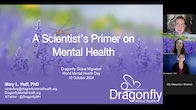 Oct 10, 2024Dr. Mary Huff, DragonflyMentalHealth.orgSupported by: AccessADVANCE, AccessComputingThere are many misconceptions about psychiatric disease: what causes it, who is at risk, and how it manifests. Increasingly, we are understanding how common these misconceptions are in academia. In this seminar and facilitated discussion, tailored for Academics, participants will learn more about prevalence of mental health illness in general and academic populations & An overview of signs and symptoms, highlighting those seen in academic settings.
Oct 10, 2024Dr. Mary Huff, DragonflyMentalHealth.orgSupported by: AccessADVANCE, AccessComputingThere are many misconceptions about psychiatric disease: what causes it, who is at risk, and how it manifests. Increasingly, we are understanding how common these misconceptions are in academia. In this seminar and facilitated discussion, tailored for Academics, participants will learn more about prevalence of mental health illness in general and academic populations & An overview of signs and symptoms, highlighting those seen in academic settings.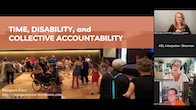 Oct 01, 2024Dr. Margaret Price, Ohio State UniversitySupported by: AccessADVANCETalk by Dr. Margaret Price on her book of the same name, Price argues for a turn toward collective accountability in order to make academe more accessible for all marginalized persons. Her presentation draws upon a survey and interview study conducted with more than 300 disabled faculty and staff members. A second hour of discussion and Q&A were not recorded to respect participant privacy on challenging topics.
Oct 01, 2024Dr. Margaret Price, Ohio State UniversitySupported by: AccessADVANCETalk by Dr. Margaret Price on her book of the same name, Price argues for a turn toward collective accountability in order to make academe more accessible for all marginalized persons. Her presentation draws upon a survey and interview study conducted with more than 300 disabled faculty and staff members. A second hour of discussion and Q&A were not recorded to respect participant privacy on challenging topics.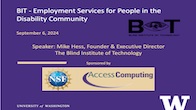 Sep 26, 2024Mike Hess, Founder and Executive Director of the Blind Institute of Technology.Supported by: AccessComputingThe Blind Institute of Technology (BIT) provides employment services to individuals with any type of disability. BIT provides staffing services that encompass both recruitment and training for professionals and through the BIT Academy, works to upskill and reskill professionals with disabilities for employment in areas such as database administration,computer networking, cloud computing, project management, business applications, and more. All courses have an independent study component as well as class lessons with our instructors and training is provided at no cost to participants.
Sep 26, 2024Mike Hess, Founder and Executive Director of the Blind Institute of Technology.Supported by: AccessComputingThe Blind Institute of Technology (BIT) provides employment services to individuals with any type of disability. BIT provides staffing services that encompass both recruitment and training for professionals and through the BIT Academy, works to upskill and reskill professionals with disabilities for employment in areas such as database administration,computer networking, cloud computing, project management, business applications, and more. All courses have an independent study component as well as class lessons with our instructors and training is provided at no cost to participants.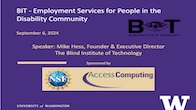 Sep 26, 2024Mike Hess, Founder and Executive Director of the Blind Institute of Technology.Supported by: AccessComputingThe Blind Institute of Technology (BIT) provides employment services to individuals with any type of disability. BIT provides staffing services that encompass both recruitment and training for professionals and through the BIT Academy, works to upskill and reskill professionals with disabilities for employment in areas such as database administration,computer networking, cloud computing, project management, business applications, and more. All courses have an independent study component as well as class lessons with our instructors and training is provided at no cost to participants.
Sep 26, 2024Mike Hess, Founder and Executive Director of the Blind Institute of Technology.Supported by: AccessComputingThe Blind Institute of Technology (BIT) provides employment services to individuals with any type of disability. BIT provides staffing services that encompass both recruitment and training for professionals and through the BIT Academy, works to upskill and reskill professionals with disabilities for employment in areas such as database administration,computer networking, cloud computing, project management, business applications, and more. All courses have an independent study component as well as class lessons with our instructors and training is provided at no cost to participants.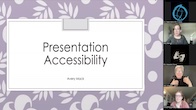 Aug 06, 2024Dr. Emma McDonnell & Dr. Kelly Avery Mack (University of Washington)Supported by: AiiCELearning disability history basics and accessibility best practices is critical for people doing work with disabled communities. In the first half of this talk, Dr. McDonnell will cover basic disability studies history and concepts, important grounding for any kind of work with people with disabilities. In the second half, Dr. Mack will teach best practices for accessible presentations. Join us to learn more about these important lessons
Aug 06, 2024Dr. Emma McDonnell & Dr. Kelly Avery Mack (University of Washington)Supported by: AiiCELearning disability history basics and accessibility best practices is critical for people doing work with disabled communities. In the first half of this talk, Dr. McDonnell will cover basic disability studies history and concepts, important grounding for any kind of work with people with disabilities. In the second half, Dr. Mack will teach best practices for accessible presentations. Join us to learn more about these important lessons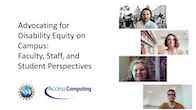 May 31, 2024Stacy Branham, Associate Professor of Informatics, University of California- Irvine; Drew King, Ability Co-Chair, on the Allen School Accessibility Committee, University of Washington; Toby Gallant, Program Assistant, Office of the ADA Coordinator, University of Washington; Michelle Garner, Associate Professor, School of Social Work and Criminal Justice, University of Washington, Employee Support Committee chair for the Staff and Faculty Association (DSFA).Supported by: AccessComputingThe panel, "Advocating for Disability Equity on Campus: Faculty, Staff, and Student Perspectives," aims to shed light on promoting an inclusive environment for individuals with disabilities within the campus community. Panelists will talk about their unique experiences, challenges, and insights regarding disability advocacy on campus. From navigating accessibility issues to fostering a culture of understanding and support, this discussion will explore the collaborative efforts needed to promote equity and empower individuals with disabilities to thrive academically and socially within the university setting.
May 31, 2024Stacy Branham, Associate Professor of Informatics, University of California- Irvine; Drew King, Ability Co-Chair, on the Allen School Accessibility Committee, University of Washington; Toby Gallant, Program Assistant, Office of the ADA Coordinator, University of Washington; Michelle Garner, Associate Professor, School of Social Work and Criminal Justice, University of Washington, Employee Support Committee chair for the Staff and Faculty Association (DSFA).Supported by: AccessComputingThe panel, "Advocating for Disability Equity on Campus: Faculty, Staff, and Student Perspectives," aims to shed light on promoting an inclusive environment for individuals with disabilities within the campus community. Panelists will talk about their unique experiences, challenges, and insights regarding disability advocacy on campus. From navigating accessibility issues to fostering a culture of understanding and support, this discussion will explore the collaborative efforts needed to promote equity and empower individuals with disabilities to thrive academically and socially within the university setting.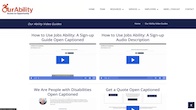 May 01, 2024John Robinson, founder & CEO, Our AbilitySupported by: AccessComputingWorkshop with Our Ability founder, John Robinson, to learn about how to use employment sites like "Our Ability".
May 01, 2024John Robinson, founder & CEO, Our AbilitySupported by: AccessComputingWorkshop with Our Ability founder, John Robinson, to learn about how to use employment sites like "Our Ability".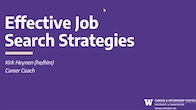 Apr 30, 2024Kirk Heynen - UW Career & Internship CenterSupported by: AccessComputingWorkshop with C&IC Career Counselor Kirk Heynen to learn tips and resources for startring an employment search.
Apr 30, 2024Kirk Heynen - UW Career & Internship CenterSupported by: AccessComputingWorkshop with C&IC Career Counselor Kirk Heynen to learn tips and resources for startring an employment search.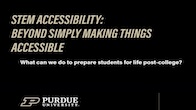 Apr 18, 2024David Schwarte & Alex Mason (Purdue University)Supported by: AiiCEMaking teaching tools accessible is only the first step in true accessibility. In this webinar the presenters discussed strategies they used to support a Blind/Low Vision Engineering major in a Mathematics course. Techniques included a variety of software, coding for 3-D printing, and other methods for producing tactile graphics.
Apr 18, 2024David Schwarte & Alex Mason (Purdue University)Supported by: AiiCEMaking teaching tools accessible is only the first step in true accessibility. In this webinar the presenters discussed strategies they used to support a Blind/Low Vision Engineering major in a Mathematics course. Techniques included a variety of software, coding for 3-D printing, and other methods for producing tactile graphics.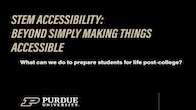 Apr 18, 2024David Schwarte & Alex Mason (Purdue University)Supported by: AiiCEMaking teaching tools accessible is only the first step in true accessibility. In this webinar the presenters discussed strategies they used to support a Blind/Low Vision Engineering major in a Mathematics course. Techniques included a variety of software, coding for 3-D printing, and other methods for producing tactile graphics. Also available without audio description
Apr 18, 2024David Schwarte & Alex Mason (Purdue University)Supported by: AiiCEMaking teaching tools accessible is only the first step in true accessibility. In this webinar the presenters discussed strategies they used to support a Blind/Low Vision Engineering major in a Mathematics course. Techniques included a variety of software, coding for 3-D printing, and other methods for producing tactile graphics. Also available without audio description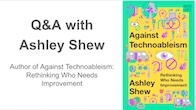 Mar 04, 2024Ashley ShewSupported by: AiiCEQ&A with Ashley Shew, author of Against Technoableism: Rethinking Who Needs Improvement.
Mar 04, 2024Ashley ShewSupported by: AiiCEQ&A with Ashley Shew, author of Against Technoableism: Rethinking Who Needs Improvement.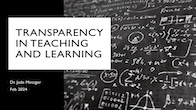 Feb 21, 2024Jade Metzger-Riftkin (Northern Arizona University)Supported by: AiiCETransparency in Learning and Teaching (TILT) refers to a teaching model that clarifies to students the instructor's choices for lesson plans and specifies how those choices relate to course goals. Research demonstrates that when students are exposed to transparent assignments, they gain academic confidence and a sense of belonging. TILT moves away from the “what” of teaching to the “how” and “why” of teaching.
Feb 21, 2024Jade Metzger-Riftkin (Northern Arizona University)Supported by: AiiCETransparency in Learning and Teaching (TILT) refers to a teaching model that clarifies to students the instructor's choices for lesson plans and specifies how those choices relate to course goals. Research demonstrates that when students are exposed to transparent assignments, they gain academic confidence and a sense of belonging. TILT moves away from the “what” of teaching to the “how” and “why” of teaching.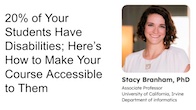 Feb 09, 2024Stacy Branham (University of California - Irvine)Supported by: AccessComputingStacy Branham, Associate Professor of Informatics at the University of California, Irvine, will share practical examples of how to create a more accessible classroom experience, which, in addition to breaking down barriers for students with disabilities, ultimately improves the learning experience for all. Her research investigates how technologies operate in social settings where one or more people have a disability, yielding actionable design guidance and proof of concept prototypes.
Feb 09, 2024Stacy Branham (University of California - Irvine)Supported by: AccessComputingStacy Branham, Associate Professor of Informatics at the University of California, Irvine, will share practical examples of how to create a more accessible classroom experience, which, in addition to breaking down barriers for students with disabilities, ultimately improves the learning experience for all. Her research investigates how technologies operate in social settings where one or more people have a disability, yielding actionable design guidance and proof of concept prototypes. Jan 22, 2024Kayla Brown (University of Washington - DO-IT)Supported by: AccessComputingThis workshop will provide some tips and strategies on how to approach letters of recommendation. During your education and career, you'll encounter supportive mentors. Selecting the right person to ask for a recommendation can be challenging. It's crucial to pick someone who is aware of your strengths and understands how they contribute to your qualifications as an applicant.
Jan 22, 2024Kayla Brown (University of Washington - DO-IT)Supported by: AccessComputingThis workshop will provide some tips and strategies on how to approach letters of recommendation. During your education and career, you'll encounter supportive mentors. Selecting the right person to ask for a recommendation can be challenging. It's crucial to pick someone who is aware of your strengths and understands how they contribute to your qualifications as an applicant.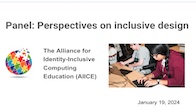 Jan 19, 2024Heather Feldner, UW CREATE; Mia Hoffman, UW HuskyADAPT; Eva Peet, Institute for Human Centered Design; Brianna Wimer, University of Notre Dame; Lauren Race, NYU Ability Project; William Christopher, UNC-Chapel Hill.Supported by: AiiCEPanel on inclusive design in technology and computing fields, that explores the intersection of accessibility and technology. This discussion delves into the importance of disability representation and inclusive design in shaping the future of technology and computing.
Jan 19, 2024Heather Feldner, UW CREATE; Mia Hoffman, UW HuskyADAPT; Eva Peet, Institute for Human Centered Design; Brianna Wimer, University of Notre Dame; Lauren Race, NYU Ability Project; William Christopher, UNC-Chapel Hill.Supported by: AiiCEPanel on inclusive design in technology and computing fields, that explores the intersection of accessibility and technology. This discussion delves into the importance of disability representation and inclusive design in shaping the future of technology and computing.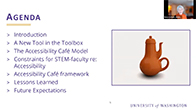 Dec 07, 2023Mary-Colleen Jenkins (University of Washington)Supported by: AccessComputingInformal results of the 'Accessibility Cafe' pilot project indicate that this can be a promising tool for building faculty awareness and skills for enhancing accessibility of their course materials. In these guided, department-focused events, faculty gather with their colleagues to learn about and fix a low-level accessibility issue in their course materials. They leave with the know-how to continue making incremental progress and feel more confident in continuing to make fixes on their own. The Accessibility Cafe framework can be easily adapted for multiple focal topics in accessibility, UDL, and other inclusive teaching practices.
Dec 07, 2023Mary-Colleen Jenkins (University of Washington)Supported by: AccessComputingInformal results of the 'Accessibility Cafe' pilot project indicate that this can be a promising tool for building faculty awareness and skills for enhancing accessibility of their course materials. In these guided, department-focused events, faculty gather with their colleagues to learn about and fix a low-level accessibility issue in their course materials. They leave with the know-how to continue making incremental progress and feel more confident in continuing to make fixes on their own. The Accessibility Cafe framework can be easily adapted for multiple focal topics in accessibility, UDL, and other inclusive teaching practices.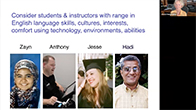 Dec 01, 2023Sheryl Burgstahler (University of Washington)Supported by: AccessComputingJoin Sheryl Burgstahler from the DO-IT Center at the University of Washington for this AccessComputing webinar. Learn some (and share some) tips for making digital materials and course activities accessible to and inclusive of students with disabilities, how universal design can be used as a framework for course design, and where to find relevant resources.
Dec 01, 2023Sheryl Burgstahler (University of Washington)Supported by: AccessComputingJoin Sheryl Burgstahler from the DO-IT Center at the University of Washington for this AccessComputing webinar. Learn some (and share some) tips for making digital materials and course activities accessible to and inclusive of students with disabilities, how universal design can be used as a framework for course design, and where to find relevant resources.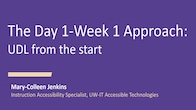 Sep 12, 2023Mary-Colleen Jenkins (University of Washington)Supported by: NNLIn this webinar, we'll discuss using principles of Universal Design for Learning (UDL) to make the most of Day 1 and Week 1 of the term. The start of the new academic term is a crucial time for instructors to set a welcoming and inclusive foundation for a classroom full of students with different learning backgrounds, needs and experiences.
Sep 12, 2023Mary-Colleen Jenkins (University of Washington)Supported by: NNLIn this webinar, we'll discuss using principles of Universal Design for Learning (UDL) to make the most of Day 1 and Week 1 of the term. The start of the new academic term is a crucial time for instructors to set a welcoming and inclusive foundation for a classroom full of students with different learning backgrounds, needs and experiences.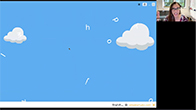 Aug 23, 2023Amy Ko (UW)Supported by: AccessComputing, AccessCSforAllIn this webinar, Amy Ko (professor in the Information School, University of Washington) examines what it might mean to center justice in programming language design and shares Wordplay.dev, a creative coding platform striving for equity and justice in accessibility and natural language.
Aug 23, 2023Amy Ko (UW)Supported by: AccessComputing, AccessCSforAllIn this webinar, Amy Ko (professor in the Information School, University of Washington) examines what it might mean to center justice in programming language design and shares Wordplay.dev, a creative coding platform striving for equity and justice in accessibility and natural language.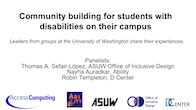 Jun 02, 2023Thomas A. Sefair-López (ASUW Office of Inclusive Design); Nayha Auradkar (Ability); Robin Templeton (University of Washington D Center)Supported by: AccessComputingVirtual panel on experiences of students in clubs and organizations in college that are specifically for the disability community.
Jun 02, 2023Thomas A. Sefair-López (ASUW Office of Inclusive Design); Nayha Auradkar (Ability); Robin Templeton (University of Washington D Center)Supported by: AccessComputingVirtual panel on experiences of students in clubs and organizations in college that are specifically for the disability community.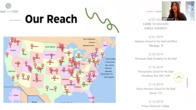 May 11, 2023Shireen Hafeez (Deaf Kids Code)Supported by: AccessCSforAllShireen Hafeez is the founder of the national outreach non-profit organization Deaf Kids Code. Since the diagnosis of her son, she became involved with advocacy and activism for kids like him. She founded the organization with the belief that the next generation of Deaf/hard of hearing kids should be contributors, leaders, makers, and innovators. The organization's first principle is that "The Digital Age is the Great Equalizer." The DKC's mission is to promote technology, design thinking, and computer science skills as a way to cultivate and ignite their students.
May 11, 2023Shireen Hafeez (Deaf Kids Code)Supported by: AccessCSforAllShireen Hafeez is the founder of the national outreach non-profit organization Deaf Kids Code. Since the diagnosis of her son, she became involved with advocacy and activism for kids like him. She founded the organization with the belief that the next generation of Deaf/hard of hearing kids should be contributors, leaders, makers, and innovators. The organization's first principle is that "The Digital Age is the Great Equalizer." The DKC's mission is to promote technology, design thinking, and computer science skills as a way to cultivate and ignite their students. Apr 21, 2023Victoria Chavez, PhD Candidate in Computer Science, Northwestern University; Emmanuelle Marquis, Professor, Department of Materials Science and Engineering, University of Michigan; Stephani Page, Director of Strategic Initiatives, Women in Engineering ProActive Network; Matthew Dowell, Assistant Professor and Director of First Year Writing, Department of English, Towson University.Supported by: AccessADVANCEThe COVID-19 pandemic has had an outsized impact on the disability community. Many people with disabilities are at a high risk for severe COVID and continue to avoid in-person gatherings. Other people have joined the disability community after acquiring long COVID. As organizations and communities return to pre-pandemic norms, what implications does this have for disability inclusion? What can we do to ensure our organizations are welcoming and accessible to people with disabilities?
Apr 21, 2023Victoria Chavez, PhD Candidate in Computer Science, Northwestern University; Emmanuelle Marquis, Professor, Department of Materials Science and Engineering, University of Michigan; Stephani Page, Director of Strategic Initiatives, Women in Engineering ProActive Network; Matthew Dowell, Assistant Professor and Director of First Year Writing, Department of English, Towson University.Supported by: AccessADVANCEThe COVID-19 pandemic has had an outsized impact on the disability community. Many people with disabilities are at a high risk for severe COVID and continue to avoid in-person gatherings. Other people have joined the disability community after acquiring long COVID. As organizations and communities return to pre-pandemic norms, what implications does this have for disability inclusion? What can we do to ensure our organizations are welcoming and accessible to people with disabilities? Apr 12, 2023Frances Biderman, Director of the D Center at the University of Washington; Melissa Vossen Callens, Associate Professor, Department of Communications at North Dakota State University; Michele Cooke, Professor and Associate Department Head for Professional Development, Department of Earth, Geographic and Climate Sciences at the University of Massachusetts Amherst; Javin D'Souza, graduate student in the College of Education and Graduate Assistant at the University of Illinois-Chicago Disability Culture Center.Supported by: AccessADVANCEDespite an abundance of initiatives focused on equity for faculty with disabilities, very few of these programs center, or even consider, the experiences of faculty with disabilities. In this webinar, we'll hear from faculty with disabilities about ways to find community and connection with other faculty with disabilities through professional organizations, disability cultural centers, and other strategies.
Apr 12, 2023Frances Biderman, Director of the D Center at the University of Washington; Melissa Vossen Callens, Associate Professor, Department of Communications at North Dakota State University; Michele Cooke, Professor and Associate Department Head for Professional Development, Department of Earth, Geographic and Climate Sciences at the University of Massachusetts Amherst; Javin D'Souza, graduate student in the College of Education and Graduate Assistant at the University of Illinois-Chicago Disability Culture Center.Supported by: AccessADVANCEDespite an abundance of initiatives focused on equity for faculty with disabilities, very few of these programs center, or even consider, the experiences of faculty with disabilities. In this webinar, we'll hear from faculty with disabilities about ways to find community and connection with other faculty with disabilities through professional organizations, disability cultural centers, and other strategies.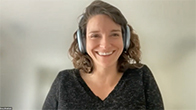 Apr 04, 2023Kimberly Thompson (Senior Director of Disability Services at Seattle University), Mark Coppin (Director of Disability Services at North Dakota State University), Stacy Branham (Associate Professor of Informatics University of California Irvine), Rob Parke (Associate Professor of Information Technology Practice at the University of Southern California)Supported by: AccessADVANCEConversations around disability in higher education often focus on access for students with disabilities and overlook the experiences of faculty with disabilities. In this webinar, you'll hear from faculty with disabilities and disability service providers on topics related to accommodations and universal design, funding for accommodations, and strategies to move beyond mere compliance with related laws.
Apr 04, 2023Kimberly Thompson (Senior Director of Disability Services at Seattle University), Mark Coppin (Director of Disability Services at North Dakota State University), Stacy Branham (Associate Professor of Informatics University of California Irvine), Rob Parke (Associate Professor of Information Technology Practice at the University of Southern California)Supported by: AccessADVANCEConversations around disability in higher education often focus on access for students with disabilities and overlook the experiences of faculty with disabilities. In this webinar, you'll hear from faculty with disabilities and disability service providers on topics related to accommodations and universal design, funding for accommodations, and strategies to move beyond mere compliance with related laws.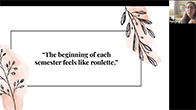 Feb 17, 2023Maya Israel, PhD (University of Florida), Joanne Barrett, EdD (University of Florida), Chris Murphy, PhD (Bryn Mawr College), Moderator: Cathy Law, PhD (Oregon State University)Supported by: AccessComputingThis panel considers language and misconceptions regarding mental health, student stories, accommodations and support, parents' perspectives, and how we can extend equity and inclusion principles to those with mental health and medical conditions.
Feb 17, 2023Maya Israel, PhD (University of Florida), Joanne Barrett, EdD (University of Florida), Chris Murphy, PhD (Bryn Mawr College), Moderator: Cathy Law, PhD (Oregon State University)Supported by: AccessComputingThis panel considers language and misconceptions regarding mental health, student stories, accommodations and support, parents' perspectives, and how we can extend equity and inclusion principles to those with mental health and medical conditions. Jan 31, 2023Emma McDonnell, Kelly Mack, Sarah Coppola (UW); Litany Lineberry (Mississippi State)Supported by: AccessComputingIn this session, University of Washington PhD students Emma McDonnell (HCDE) and Kelly Mack (CSE) present their work around how technology design can better consider people with chronic illnesses. Following the presentation, there will be a panel where other community members will share their thoughts on the topic.
Jan 31, 2023Emma McDonnell, Kelly Mack, Sarah Coppola (UW); Litany Lineberry (Mississippi State)Supported by: AccessComputingIn this session, University of Washington PhD students Emma McDonnell (HCDE) and Kelly Mack (CSE) present their work around how technology design can better consider people with chronic illnesses. Following the presentation, there will be a panel where other community members will share their thoughts on the topic. Jan 27, 2023Madison Jordan, Erin Howard, Seoyun Kim, Aimee ReyesSupported by: AiiCEThis session features professionals with invisible disabilities who will share their experiences in academia and the workforce.
Jan 27, 2023Madison Jordan, Erin Howard, Seoyun Kim, Aimee ReyesSupported by: AiiCEThis session features professionals with invisible disabilities who will share their experiences in academia and the workforce.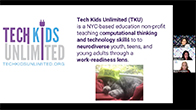 Jan 26, 2023Beth Rosenberg, Halenue Komsul, Haley Shibble (Tech Kids Unlimited)Supported by: AccessCSforAllTech Kids Unlimited (TKU) works with neurodiverse students to teach them computer science principles, technology and social emotional skills. Learn how neurodiverse teens can become advocates for their own learning through TKU's Digital Agency enterprise—where students work on real digital products for clients and get paid.
Jan 26, 2023Beth Rosenberg, Halenue Komsul, Haley Shibble (Tech Kids Unlimited)Supported by: AccessCSforAllTech Kids Unlimited (TKU) works with neurodiverse students to teach them computer science principles, technology and social emotional skills. Learn how neurodiverse teens can become advocates for their own learning through TKU's Digital Agency enterprise—where students work on real digital products for clients and get paid.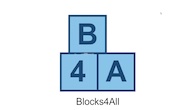 Dec 07, 2022Richard Ladner (University of Washington), Lauren Milne (Macalester College), Andreas Stefik (University of Nevada, Las Vegas)Supported by: AccessCSforAllMost of the tools used in K12 computer science education are not accessible to students with disabilities, especially students who are blind or have low vision. In this webinar, we share about the Quorum programming language, Blocks4All, and other tools that are accessible to students with disabilities. You'll also learn about resources to support teachers who have students with disabilities in their classes.
Dec 07, 2022Richard Ladner (University of Washington), Lauren Milne (Macalester College), Andreas Stefik (University of Nevada, Las Vegas)Supported by: AccessCSforAllMost of the tools used in K12 computer science education are not accessible to students with disabilities, especially students who are blind or have low vision. In this webinar, we share about the Quorum programming language, Blocks4All, and other tools that are accessible to students with disabilities. You'll also learn about resources to support teachers who have students with disabilities in their classes.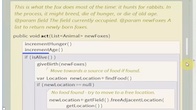 Nov 30, 2022Neil Brown (King's College London)Supported by: AccessComputing, AccessCSforAllBlock-based programming is very popular in introductory programming. Its drag-and-drop design is very approachable for novices -- but not for the vision impaired and others who would like to use a screen reader and keyboard entry.
Nov 30, 2022Neil Brown (King's College London)Supported by: AccessComputing, AccessCSforAllBlock-based programming is very popular in introductory programming. Its drag-and-drop design is very approachable for novices -- but not for the vision impaired and others who would like to use a screen reader and keyboard entry.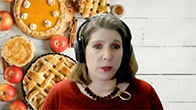 Nov 14, 2022Adrienne Decker (University at Buffalo), Andrew Begel (Carnegie Mellon), and Kurt Eiselt (University of California, Davis)Supported by: AccessComputingThis panel will present a number of different perspectives and programs that support neurodivergent students in their coursework and in the workplace. Like many students transitioning to college, neurodivergent students lose many of their prior scaffolds and supports. Unlike neurotypical students, they often have difficulty self-advocating to acquire the help that they need to succeed. They have lower completion rates for courses and degrees and are more likely to take time off in the middle of their degree program. Supporting these students in our classrooms and degree programs requires training faculty on the challenges they experience and developing curriculum and supports that afford better access. In addition to in-classroom support, support is needed to prepare students to enter the workforce and help them stay employed. While supporting students and faculty is important, one of the other goals of programs like these is to help destigmatize neurodiverse people, help neurotypical people better understand their neurodivergent colleagues, and encourage everyone to better integrate the neurodiverse into their organizations and activities.
Nov 14, 2022Adrienne Decker (University at Buffalo), Andrew Begel (Carnegie Mellon), and Kurt Eiselt (University of California, Davis)Supported by: AccessComputingThis panel will present a number of different perspectives and programs that support neurodivergent students in their coursework and in the workplace. Like many students transitioning to college, neurodivergent students lose many of their prior scaffolds and supports. Unlike neurotypical students, they often have difficulty self-advocating to acquire the help that they need to succeed. They have lower completion rates for courses and degrees and are more likely to take time off in the middle of their degree program. Supporting these students in our classrooms and degree programs requires training faculty on the challenges they experience and developing curriculum and supports that afford better access. In addition to in-classroom support, support is needed to prepare students to enter the workforce and help them stay employed. While supporting students and faculty is important, one of the other goals of programs like these is to help destigmatize neurodiverse people, help neurotypical people better understand their neurodivergent colleagues, and encourage everyone to better integrate the neurodiverse into their organizations and activities.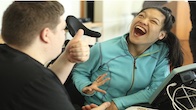 Aug 08, 2022Richard Ladner (UW)Supported by: AccessCSforAllAbout 8.7 million PreK-12 students in the US have a disability and are served under the Individuals with Disabilities Act or under Section 504 of the Rehabilitation Act. These students have a number of barriers that prevent them from participating fully in CS education. In this webinar we discuss these barriers and how they can be removed to make CS education more accessible and welcoming to these students. Resources including accessible programming environments universal design for learning pedagogies will be discussed. The strategies presented in the webinar can be used in both pre-service and in-service CS education programs to supplement other diversity, equity, and inclusion parts of these programs.
Aug 08, 2022Richard Ladner (UW)Supported by: AccessCSforAllAbout 8.7 million PreK-12 students in the US have a disability and are served under the Individuals with Disabilities Act or under Section 504 of the Rehabilitation Act. These students have a number of barriers that prevent them from participating fully in CS education. In this webinar we discuss these barriers and how they can be removed to make CS education more accessible and welcoming to these students. Resources including accessible programming environments universal design for learning pedagogies will be discussed. The strategies presented in the webinar can be used in both pre-service and in-service CS education programs to supplement other diversity, equity, and inclusion parts of these programs.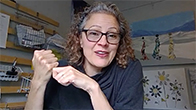 May 06, 2022Brianna Blaser & Richard Ladner (UW), Tina Ostrander (Green River College)Supported by: AccessComputingLearn more about strategies and resources to support students with disabilities in computing programs at community and technical colleges. There are funded opportunities to support your work in this area! Learn more about how AccessComputing can support faculty and staff at community and technical colleges to increase the participation of students with disabilities in computing departments.
May 06, 2022Brianna Blaser & Richard Ladner (UW), Tina Ostrander (Green River College)Supported by: AccessComputingLearn more about strategies and resources to support students with disabilities in computing programs at community and technical colleges. There are funded opportunities to support your work in this area! Learn more about how AccessComputing can support faculty and staff at community and technical colleges to increase the participation of students with disabilities in computing departments.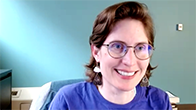 Apr 22, 2022Rua Mae Williams (Purdue), Martina Svyantek (University of Virginia)Supported by: AccessADVANCEIn 2022, Disabled faculty and students are requesting accommodations to remain off campus or to limit in-person exposure through continued access to remote or hybrid delivery of instruction. Many universities are denying these requests by calling them "unreasonable burdens" to the institution or citing institutional business interests. Remote and hybrid instruction is neither an unreasonable burden (as proved by our past few semesters), nor does it interfere with the essential functions of "the position" -- instructing and learning. This webinar is a discussion of a book chapter contextualizing the Covid-19 pandemic’s effects on office-based and academic workspaces using a critical disability studies approach.
Apr 22, 2022Rua Mae Williams (Purdue), Martina Svyantek (University of Virginia)Supported by: AccessADVANCEIn 2022, Disabled faculty and students are requesting accommodations to remain off campus or to limit in-person exposure through continued access to remote or hybrid delivery of instruction. Many universities are denying these requests by calling them "unreasonable burdens" to the institution or citing institutional business interests. Remote and hybrid instruction is neither an unreasonable burden (as proved by our past few semesters), nor does it interfere with the essential functions of "the position" -- instructing and learning. This webinar is a discussion of a book chapter contextualizing the Covid-19 pandemic’s effects on office-based and academic workspaces using a critical disability studies approach.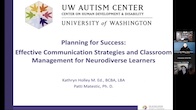 Apr 22, 2022Kathryn Holley (The UW Autism Center)Supported by: NNLPlanning for Success: Effective Communication Strategies and Classroom Management for Neurodiverse Learners - STEM and Neurodiversity: A Capacity Building Institute for STEM Faculty at Community and Technical Colleges
Apr 22, 2022Kathryn Holley (The UW Autism Center)Supported by: NNLPlanning for Success: Effective Communication Strategies and Classroom Management for Neurodiverse Learners - STEM and Neurodiversity: A Capacity Building Institute for STEM Faculty at Community and Technical Colleges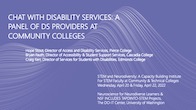 Apr 22, 2022Hope Stout (Pierce College); Bryan Fauth (Cascadia College) and Craig Kerr (Edmonds College)Supported by: NNLChat With a Disability Services Panel - STEM and Neurodiversity: A Capacity Building Institute for STEM Faculty at Community and Technical Colleges.
Apr 22, 2022Hope Stout (Pierce College); Bryan Fauth (Cascadia College) and Craig Kerr (Edmonds College)Supported by: NNLChat With a Disability Services Panel - STEM and Neurodiversity: A Capacity Building Institute for STEM Faculty at Community and Technical Colleges.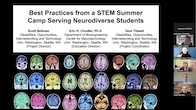 Apr 22, 2022Eric Chudler (UW Center for Neurotechnology); Scott Bellman, Tami Tidwell (UW DO-IT)Supported by: NNLBest Practices from an Online STEM Summer Camp Serving Neurodiverse Students - STEM and Neurodiversity: A Capacity Building Institute for STEM Faculty at Community and Technical Colleges
Apr 22, 2022Eric Chudler (UW Center for Neurotechnology); Scott Bellman, Tami Tidwell (UW DO-IT)Supported by: NNLBest Practices from an Online STEM Summer Camp Serving Neurodiverse Students - STEM and Neurodiversity: A Capacity Building Institute for STEM Faculty at Community and Technical Colleges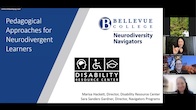 Apr 20, 2022Sara Gardner Sanders (Bellevue College), Marisa Hackett (Bellevue College)Supported by: NNLPedagogical Approaches for Neurodivergent Learners in STEM - Given at the STEM and Neurodiversity: A Capacity Building Institute for STEM Faculty at Community and Technical Colleges.
Apr 20, 2022Sara Gardner Sanders (Bellevue College), Marisa Hackett (Bellevue College)Supported by: NNLPedagogical Approaches for Neurodivergent Learners in STEM - Given at the STEM and Neurodiversity: A Capacity Building Institute for STEM Faculty at Community and Technical Colleges.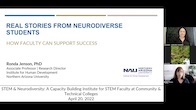 Apr 20, 2022Ronda Jensen (Northern Arizona University)Supported by: NNLReal stories from neurodiverse students on how STEM faculty can support success - STEM and Neurodiversity: A Capacity Building Institute for STEM Faculty at Community and Technical Colleges.
Apr 20, 2022Ronda Jensen (Northern Arizona University)Supported by: NNLReal stories from neurodiverse students on how STEM faculty can support success - STEM and Neurodiversity: A Capacity Building Institute for STEM Faculty at Community and Technical Colleges. Mar 30, 2022Andreas Stefik & William Alee (Univ of Nevada Las Vegas)Supported by: AccessCSforAllModern block languages consist of a complex series of moving parts. While they do have visualizations of the computer code, they also contain graphical editors, game editors, robotics systems, community forums, multimedia output, and many other attributes that must be accessible for students with disabilities to meaningfully and fully participate in computer science. In this webinar, we provide a summary of the state of what is and is not accessible across block languages and then foster a discussion about how we might get there.
Mar 30, 2022Andreas Stefik & William Alee (Univ of Nevada Las Vegas)Supported by: AccessCSforAllModern block languages consist of a complex series of moving parts. While they do have visualizations of the computer code, they also contain graphical editors, game editors, robotics systems, community forums, multimedia output, and many other attributes that must be accessible for students with disabilities to meaningfully and fully participate in computer science. In this webinar, we provide a summary of the state of what is and is not accessible across block languages and then foster a discussion about how we might get there.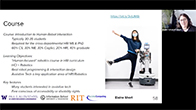 Mar 02, 2022Richard Ladner, Amy Ko, Kristen Shinohara, Devorah Kletenik, Rachel F. Adler, Michael Moore, William Bares, Regine Gilbert, Meg Ray, Deborah Sturm, Elissa Weeden, Elaine Short, Kathy McCoy, Debra Yarrington, Paula Gabbert, Yasmine Elglaly, Catherine Baker, Joel Ross, Jennifer MankoffSupported by: AccessComputingIn this SIGCSE affiliated session, faculty shared about how they have integrated accessibility and disability topics into their computer science (CS) courses. There are certain courses, such as web or app design and development and human-computer interactions, that should be addressing accessibility because of the human-facing nature of software. Less obvious are courses, such as intro CS, computer vision, natural language processing, data compression, software engineering, and others, that can also have accessibility and disability content.
Mar 02, 2022Richard Ladner, Amy Ko, Kristen Shinohara, Devorah Kletenik, Rachel F. Adler, Michael Moore, William Bares, Regine Gilbert, Meg Ray, Deborah Sturm, Elissa Weeden, Elaine Short, Kathy McCoy, Debra Yarrington, Paula Gabbert, Yasmine Elglaly, Catherine Baker, Joel Ross, Jennifer MankoffSupported by: AccessComputingIn this SIGCSE affiliated session, faculty shared about how they have integrated accessibility and disability topics into their computer science (CS) courses. There are certain courses, such as web or app design and development and human-computer interactions, that should be addressing accessibility because of the human-facing nature of software. Less obvious are courses, such as intro CS, computer vision, natural language processing, data compression, software engineering, and others, that can also have accessibility and disability content.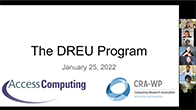 Jan 25, 2022Richard Ladner, Raja Kushalnagar; students: Caelan MacArthur, Erin HowardSupported by: AccessComputingIn this Zoom presentation students interested in applying for DREU for Summer 2022 receive information on the DREU process and hear from prior DREU participants.
Jan 25, 2022Richard Ladner, Raja Kushalnagar; students: Caelan MacArthur, Erin HowardSupported by: AccessComputingIn this Zoom presentation students interested in applying for DREU for Summer 2022 receive information on the DREU process and hear from prior DREU participants.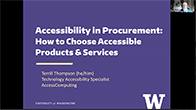 Nov 09, 2021Terrill Thompson (DO-IT)Supported by: AccessComputingYou're shopping for an online platform to use for a virtual conference you're organizing, or you're considering adopting a new technology for the courses you teach. You want, and may in fact be legally obligated, to ensure the product or service you choose is accessible to all users, including those with disabilities. How do you do that? This webinar will explore strategies for addressing accessibility at various stages within the procurement process. It will include extensive detail about technology accessibility standards, plus guidance on how to read a Voluntary Product Accessibility Template (VPAT), a standard form used by technology vendors to document their level of accessibility. Our speaker Terrill Thompson is manager of the IT Accessibility Team at the University of Washington, and technology accessibility specialist with AccessComputing. He has nearly thirty years of experience in the IT accessibility field.
Nov 09, 2021Terrill Thompson (DO-IT)Supported by: AccessComputingYou're shopping for an online platform to use for a virtual conference you're organizing, or you're considering adopting a new technology for the courses you teach. You want, and may in fact be legally obligated, to ensure the product or service you choose is accessible to all users, including those with disabilities. How do you do that? This webinar will explore strategies for addressing accessibility at various stages within the procurement process. It will include extensive detail about technology accessibility standards, plus guidance on how to read a Voluntary Product Accessibility Template (VPAT), a standard form used by technology vendors to document their level of accessibility. Our speaker Terrill Thompson is manager of the IT Accessibility Team at the University of Washington, and technology accessibility specialist with AccessComputing. He has nearly thirty years of experience in the IT accessibility field.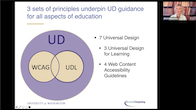 Oct 28, 2021Sheryl Burgstahler (DO-IT), Brianna Blaser (DO-IT)Supported by: AccessADVANCEIn this webinar, Sheryl Burgstahler, AccessADVANCE PI, and Brianna Blaser, AccessADVANCE Associate Director, will share a framework and point to systemic issues campus leaders and advocates can consider to increase the successful participation of faculty with disabilities in STEM fields. The framework was developed with input and guidance from AccessADVANCE collaborators engaged in collaborative meetings and an online community of practice.
Oct 28, 2021Sheryl Burgstahler (DO-IT), Brianna Blaser (DO-IT)Supported by: AccessADVANCEIn this webinar, Sheryl Burgstahler, AccessADVANCE PI, and Brianna Blaser, AccessADVANCE Associate Director, will share a framework and point to systemic issues campus leaders and advocates can consider to increase the successful participation of faculty with disabilities in STEM fields. The framework was developed with input and guidance from AccessADVANCE collaborators engaged in collaborative meetings and an online community of practice.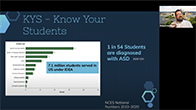 Jun 16, 2021Robert DeFillippo (Mon Valley School)Supported by: AccessCSforAllThrough a 4-part webinar series Accessible Computer Science: Teacher to Teacher, computer science teachers who specialize in teaching blind and visually impaired students, deaf and hard of hearing students, and learning disabled and neurodiverse students will share strategies that other K-12 educators can use to include students with disabilities in their classroom. In this webinar, Robert DeFillippo will share about lessons learned teaching computer science to students who are neurodiverse. Accessible Computer Science: Teacher to Teacher is funded by the Infosys Foundation USA.
Jun 16, 2021Robert DeFillippo (Mon Valley School)Supported by: AccessCSforAllThrough a 4-part webinar series Accessible Computer Science: Teacher to Teacher, computer science teachers who specialize in teaching blind and visually impaired students, deaf and hard of hearing students, and learning disabled and neurodiverse students will share strategies that other K-12 educators can use to include students with disabilities in their classroom. In this webinar, Robert DeFillippo will share about lessons learned teaching computer science to students who are neurodiverse. Accessible Computer Science: Teacher to Teacher is funded by the Infosys Foundation USA.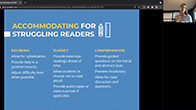 May 11, 2021Sarah Ciras (Landmark School)Supported by: AccessCSforAllThrough a 4-part webinar series Accessible Computer Science: Teacher to Teacher, computer science teachers who specialize in teaching blind and visually impaired students, deaf and hard of hearing students, and learning disabled and neurodiverse students will share strategies that other K-12 educators can use to include students with disabilities in their classroom. In this webinar, Sarah Ciras will share about lessons learned teaching computer science to students with learning disabilities. Accessible Computer Science: Teacher to Teacher is funded by the Infosys Foundation USA.
May 11, 2021Sarah Ciras (Landmark School)Supported by: AccessCSforAllThrough a 4-part webinar series Accessible Computer Science: Teacher to Teacher, computer science teachers who specialize in teaching blind and visually impaired students, deaf and hard of hearing students, and learning disabled and neurodiverse students will share strategies that other K-12 educators can use to include students with disabilities in their classroom. In this webinar, Sarah Ciras will share about lessons learned teaching computer science to students with learning disabilities. Accessible Computer Science: Teacher to Teacher is funded by the Infosys Foundation USA.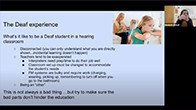 Apr 07, 2021Beth Kimball (Indiana School for the Deaf)Supported by: AccessCSforAllThrough a 4-part webinar series Accessible Computer Science: Teacher to Teacher, computer science teachers who specialize in teaching blind and visually impaired students, deaf and hard of hearing students, and learning disabled and neurodiverse students will share strategies that other K-12 educators can use to include students with disabilities in their classroom. In this webinar, Elizabeth (Beth) Kimball will share about lessons learned teaching computer science to students who are deaf and hearing impaired. Accessible Computer Science: Teacher to Teacher is funded by the Infosys Foundation USA.
Apr 07, 2021Beth Kimball (Indiana School for the Deaf)Supported by: AccessCSforAllThrough a 4-part webinar series Accessible Computer Science: Teacher to Teacher, computer science teachers who specialize in teaching blind and visually impaired students, deaf and hard of hearing students, and learning disabled and neurodiverse students will share strategies that other K-12 educators can use to include students with disabilities in their classroom. In this webinar, Elizabeth (Beth) Kimball will share about lessons learned teaching computer science to students who are deaf and hearing impaired. Accessible Computer Science: Teacher to Teacher is funded by the Infosys Foundation USA.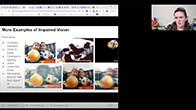 Mar 25, 2021Gina Fugate (Maryland School for the Blind)Supported by: AccessCSforAllThrough a 4-part webinar series Accessible Computer Science: Teacher to Teacher, computer science teachers who specialize in teaching blind and visually impaired students, deaf and hard of hearing students, and learning disabled and neurodiverse students will share strategies that other K-12 educators can use to include students with disabilities in their classroom. In this webinar, Gina Fugate will share about lessons learned teaching computer science to students who are blind and visually impaired. Accessible Computer Science: Teacher to Teacher is funded by the Infosys Foundation USA.
Mar 25, 2021Gina Fugate (Maryland School for the Blind)Supported by: AccessCSforAllThrough a 4-part webinar series Accessible Computer Science: Teacher to Teacher, computer science teachers who specialize in teaching blind and visually impaired students, deaf and hard of hearing students, and learning disabled and neurodiverse students will share strategies that other K-12 educators can use to include students with disabilities in their classroom. In this webinar, Gina Fugate will share about lessons learned teaching computer science to students who are blind and visually impaired. Accessible Computer Science: Teacher to Teacher is funded by the Infosys Foundation USA.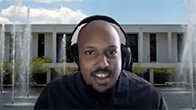 Feb 17, 2021Earl Huff (Clemson University)Supported by: AccessCSforAllTo ensure an inclusive computing education, we must examine the suitability and learning experience of existing curricula if they accommodate students with disabilities, especially those blind or who have low vision. This webinar provides an account of the learning and teaching experience in computing education for persons with visual impairments from different perspectives: blind or visually impaired programmers, teachers of blind or visually impaired students, and blind or visually impaired students. A summary of all accounts is provided and potential solutions for improving accessibility in K-12 computing education.
Feb 17, 2021Earl Huff (Clemson University)Supported by: AccessCSforAllTo ensure an inclusive computing education, we must examine the suitability and learning experience of existing curricula if they accommodate students with disabilities, especially those blind or who have low vision. This webinar provides an account of the learning and teaching experience in computing education for persons with visual impairments from different perspectives: blind or visually impaired programmers, teachers of blind or visually impaired students, and blind or visually impaired students. A summary of all accounts is provided and potential solutions for improving accessibility in K-12 computing education. Nov 23, 2020Kayla Brown (UW)Supported by: AccessComputingKayla Brown talks about what it means to be disabled, looks at some key moments for the disability rights movement, and discusses common tropes for characters with disabilities in the media. Learn about the medical and social models of disability, examine the history of disability and the disability rights movement in the United States and how this has impacted perceptions of disability, and identify common tropes in the media that negatively portrays disability.
Nov 23, 2020Kayla Brown (UW)Supported by: AccessComputingKayla Brown talks about what it means to be disabled, looks at some key moments for the disability rights movement, and discusses common tropes for characters with disabilities in the media. Learn about the medical and social models of disability, examine the history of disability and the disability rights movement in the United States and how this has impacted perceptions of disability, and identify common tropes in the media that negatively portrays disability.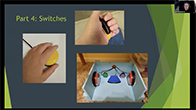 Nov 12, 2020Anna Kirkpatrick (Georgia Tech)Supported by: AccessCSforAllAnna shares her personal journey of finding and making tools to allow her to write code efficiently. She discusses her use of inexpensive eye tracking hardware marketed for video games, provides an overview of the open source software project OptiKey, recounts the development of a custom OptiKey keyboard specifically for writing code, and discusses the text editor vim and how features of vim interface well with eye gaze input.
Nov 12, 2020Anna Kirkpatrick (Georgia Tech)Supported by: AccessCSforAllAnna shares her personal journey of finding and making tools to allow her to write code efficiently. She discusses her use of inexpensive eye tracking hardware marketed for video games, provides an overview of the open source software project OptiKey, recounts the development of a custom OptiKey keyboard specifically for writing code, and discusses the text editor vim and how features of vim interface well with eye gaze input. Oct 20, 2020
Oct 20, 2020- Richard Ladner (UW Allen School)
- Anna Kirkpatrick (Georgia Tech)
- Ather Sharif (UW)
- Liia Butler (Univ of Illinois Urbana Champaign)
Supported by: AccessComputingIn this webinar, AccessComputing PI Richard Ladner presents a primer on choosing and applying to a graduate school and current graduate students share about their own experiences. Sep 10, 2020Andreas Stefik (Univ of Nevada Las Vegas)Supported by: AccessCSforAllAP Computer Science Principles and other K-12 curricula include units covering using and interpreting data. Ensuring that data, and even data science, is accessible to students with disabilities is not a trivial problem. In this webinar, AccessCSforAll PI and inventor of the Quorum programming language Andreas Stefik shared the approach used in the Quorum programming language.
Sep 10, 2020Andreas Stefik (Univ of Nevada Las Vegas)Supported by: AccessCSforAllAP Computer Science Principles and other K-12 curricula include units covering using and interpreting data. Ensuring that data, and even data science, is accessible to students with disabilities is not a trivial problem. In this webinar, AccessCSforAll PI and inventor of the Quorum programming language Andreas Stefik shared the approach used in the Quorum programming language.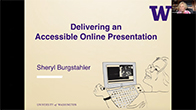 Aug 20, 2020Sheryl Burgstahler (UW)Supported by: AccessComputingAs classes, internships, and other activities have moved online, what strategies have you used or can you use to make a good impression on your professor and other students? In this webinar, Sheryl Burgstahler (Director of DO-IT) shares tips and tricks to ensure that you look professional in a virtual environment, particularly as a college student in class or presenting a required presentation.
Aug 20, 2020Sheryl Burgstahler (UW)Supported by: AccessComputingAs classes, internships, and other activities have moved online, what strategies have you used or can you use to make a good impression on your professor and other students? In this webinar, Sheryl Burgstahler (Director of DO-IT) shares tips and tricks to ensure that you look professional in a virtual environment, particularly as a college student in class or presenting a required presentation. Aug 04, 2020Janette Barrios and Jordyn Castor (Apple)Supported by: AccessCSforAllExplore the latest accessible coding resources for iPad and Mac, including free iPad app Swift Playgrounds, accessible curriculum, tactile graphics, videos in American Sign Language, and resources that support students with disabilities at various stages and age - including fun activities like flying drones and dancing robots! Coding is an essential skill for helping all students thrive in a technology-driven future - it unlocks creativity, develops problem-solving skills, and opens career paths. Learn how easy and fun it can be to code!
Aug 04, 2020Janette Barrios and Jordyn Castor (Apple)Supported by: AccessCSforAllExplore the latest accessible coding resources for iPad and Mac, including free iPad app Swift Playgrounds, accessible curriculum, tactile graphics, videos in American Sign Language, and resources that support students with disabilities at various stages and age - including fun activities like flying drones and dancing robots! Coding is an essential skill for helping all students thrive in a technology-driven future - it unlocks creativity, develops problem-solving skills, and opens career paths. Learn how easy and fun it can be to code!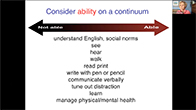 Jun 18, 2020Sheryl Burgstahler, Terrill Thompson, Brianna Blaser (DO-IT)Supported by: AccessINCLUDESHow can you ensure that individuals with disabilities feel welcome and are able to participate in your classes, meetings, and other online activities? This virtual capacity building institute (CBI) addressed a variety of accessibility including universal design in online learning; accessibility of websites, documents, video, and vendor products; and accessibility and universal design of online meetings.
Jun 18, 2020Sheryl Burgstahler, Terrill Thompson, Brianna Blaser (DO-IT)Supported by: AccessINCLUDESHow can you ensure that individuals with disabilities feel welcome and are able to participate in your classes, meetings, and other online activities? This virtual capacity building institute (CBI) addressed a variety of accessibility including universal design in online learning; accessibility of websites, documents, video, and vendor products; and accessibility and universal design of online meetings.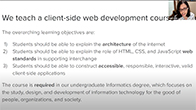 Jun 16, 2020
Jun 16, 2020- Moderator: Richard Ladner, University of Washington
- Panelists:
- Anat Caspi, University of Washington
- Leah Findlater, University of Washington
- Paula Gabbert, Furman University
- Amy J. Ko, University of Washington
- Daniel E. Krutz, Rochester Institute of Technology
Supported by: AccessComputingThis panel, originally scheduled to occur at SIGCSE 2020, provided practical advice on what and how to teach accessibility in a variety of settings. It is important to learn about the diverse technology consumers: what their abilities are and what access infrastructures they use every day. Teaching about computer technologies that people with various disabilities can use and be productive with prepares students to design accessible technology when they graduate. The panelists have extensive experience in teaching accessibility and provided advice to others about how to teach accessibility in their own courses. Apr 29, 2020Abby Schmiedt (Google)Supported by: AccessCSforAllBlockly is a JavaScript library that is used in a number of applications, such as Scratch and Makecode, to help teach students how to code. Over the last year we have been working on adding keyboard navigation support to Blockly. In this talk, I plan to talk through some of the challenges we have faced, what we have ended up with, and where we are hoping to go in the future.
Apr 29, 2020Abby Schmiedt (Google)Supported by: AccessCSforAllBlockly is a JavaScript library that is used in a number of applications, such as Scratch and Makecode, to help teach students how to code. Over the last year we have been working on adding keyboard navigation support to Blockly. In this talk, I plan to talk through some of the challenges we have faced, what we have ended up with, and where we are hoping to go in the future.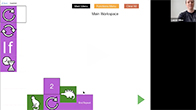 Feb 11, 2020Lauren Milne (Macalester College)Supported by: AccessCSforAllLauren Milne is an assistant professor at Macalester College. Her research is on making programming more accessible for children with visual impairments. She will be doing a demo of Blocks4All, an iPad application she developed, which can be used to program the Dash and Dot robots from Wonder Workshop and which is accessible with VoiceOver and Switch Control.
Feb 11, 2020Lauren Milne (Macalester College)Supported by: AccessCSforAllLauren Milne is an assistant professor at Macalester College. Her research is on making programming more accessible for children with visual impairments. She will be doing a demo of Blocks4All, an iPad application she developed, which can be used to program the Dash and Dot robots from Wonder Workshop and which is accessible with VoiceOver and Switch Control. Feb 07, 2020Neil Barnett (Microsoft), Lorne Needle (Google)Supported by: AccessComputingYou may have heard that many companies are stepping up their efforts to hire people with disabilities. In this webinar, we'll here from representatives at Microsoft and Google about what they're companies are doing. Neil Barnett started Microsoft’s Autism hiring program in 2015 and is leading the efforts to improve the experiences for Microsoft employees and their customers with disabilities. Lorne Needle is Google’s global lead for disability inclusion in staffing and has led multiple talent initiatives.
Feb 07, 2020Neil Barnett (Microsoft), Lorne Needle (Google)Supported by: AccessComputingYou may have heard that many companies are stepping up their efforts to hire people with disabilities. In this webinar, we'll here from representatives at Microsoft and Google about what they're companies are doing. Neil Barnett started Microsoft’s Autism hiring program in 2015 and is leading the efforts to improve the experiences for Microsoft employees and their customers with disabilities. Lorne Needle is Google’s global lead for disability inclusion in staffing and has led multiple talent initiatives.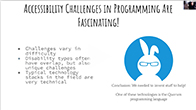 Jan 14, 2020Andreas Stefik (Univ of Nevada Las Vegas)Supported by: AccessCSforAllThe Quorum Programming Language is the first evidenced-oriented programming language that was “born accessible” more than ten years ago. New is Quorum Studio, an accessible integrated development environment (IDE) to support programmers in Quorum. Quorum Studio is built on the same design principles as the language itself, making it accessible to users, including blind users who employ screen readers. In the first version, we have created a full development environment for editing, navigating, compiling, debugging, and executing applications, in addition to typical help features (e.g., highlighting, code completion, projects, updates) and accessibility features (e.g., smart zoom, smart navigation, a highly customized screen reading experience). Quorum Studio is also a platform for future accessible growth, with 3D visual level editing, still fully accessible even if the user is blind, coming in the summer of 2020 in Quorum Studio 2.
Jan 14, 2020Andreas Stefik (Univ of Nevada Las Vegas)Supported by: AccessCSforAllThe Quorum Programming Language is the first evidenced-oriented programming language that was “born accessible” more than ten years ago. New is Quorum Studio, an accessible integrated development environment (IDE) to support programmers in Quorum. Quorum Studio is built on the same design principles as the language itself, making it accessible to users, including blind users who employ screen readers. In the first version, we have created a full development environment for editing, navigating, compiling, debugging, and executing applications, in addition to typical help features (e.g., highlighting, code completion, projects, updates) and accessibility features (e.g., smart zoom, smart navigation, a highly customized screen reading experience). Quorum Studio is also a platform for future accessible growth, with 3D visual level editing, still fully accessible even if the user is blind, coming in the summer of 2020 in Quorum Studio 2.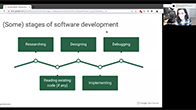 Nov 14, 2019Julia Ferraioli (Google)Supported by: AccessCSforAllBy instituting good practices around code accessibility early on, you can foster an inclusive team that can run an accessible project. In addition to making your code base accessible to those with disabilities, these adaptations can make your project easier to navigate for everyone, new contributors and senior developers alike.
Nov 14, 2019Julia Ferraioli (Google)Supported by: AccessCSforAllBy instituting good practices around code accessibility early on, you can foster an inclusive team that can run an accessible project. In addition to making your code base accessible to those with disabilities, these adaptations can make your project easier to navigate for everyone, new contributors and senior developers alike.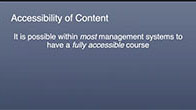 Nov 07, 2019Gaby de Jongh (DO-IT)Supported by: ADEPTWhat is it like for someone who uses Assistive Technology to interact with information that is NOT accessible? What does “Accessible Content” mean and how do you create it? Depending upon the tools used to create content, it is entirely possible to create a project that is accessible. We will cover best practices, tools, and resources for creating accessible materials and presentations for your inclusive projects.
Nov 07, 2019Gaby de Jongh (DO-IT)Supported by: ADEPTWhat is it like for someone who uses Assistive Technology to interact with information that is NOT accessible? What does “Accessible Content” mean and how do you create it? Depending upon the tools used to create content, it is entirely possible to create a project that is accessible. We will cover best practices, tools, and resources for creating accessible materials and presentations for your inclusive projects.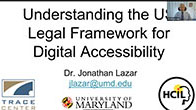 Oct 28, 2019Jonathan Lazar (University of Maryland)Supported by: ADEPTDid you hear that in early October, the U.S. Supreme Court declined to hear the Robles v. Domino's Pizza case and do you wonder what that means related to digital accessibility for people with disabilities? Did you hear that 100 members of congress wrote a letter saying that people with disabilities should not currently have the legal right to access websites of public accommodations, and wonder if that has any legal impact? (spoiler alert: it doesn't). Join our webinar and learn more about the US legal framework for digital accessibility.
Oct 28, 2019Jonathan Lazar (University of Maryland)Supported by: ADEPTDid you hear that in early October, the U.S. Supreme Court declined to hear the Robles v. Domino's Pizza case and do you wonder what that means related to digital accessibility for people with disabilities? Did you hear that 100 members of congress wrote a letter saying that people with disabilities should not currently have the legal right to access websites of public accommodations, and wonder if that has any legal impact? (spoiler alert: it doesn't). Join our webinar and learn more about the US legal framework for digital accessibility.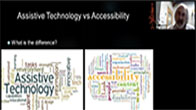 Oct 10, 2019David L. Jaffe (Stanford University)Supported by: ADEPTDavid will address differences between Accessibility and Assistive Technology, review Universal Design Principles, and provide an overview of the engineering design process for assistive technology devices with slides illuminated with colorful graphics.
Oct 10, 2019David L. Jaffe (Stanford University)Supported by: ADEPTDavid will address differences between Accessibility and Assistive Technology, review Universal Design Principles, and provide an overview of the engineering design process for assistive technology devices with slides illuminated with colorful graphics.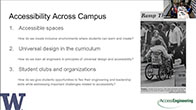 Sep 04, 2019Panelists: Kat Steele (UW Mechanical Engineering), Alyssa Taylor (UW Bioengineering), Molly Mollica (UW Bioengineering), Dianne Hendricks (UW Human Centered Design and Engineering); Moderator: Brianna Blaser (DO-IT)Supported by: ADEPTAcross a College of Engineering, there are multiple avenues for engaging in conversations related to disability, accessibility, and universal design. In this webinar, we’ll hear about initiatives across the University of Washington’s College of Engineering that address disability through curriculum, makerspaces, student activities, and other avenues and ways to build community around these topics. We’ll explore student engagement, resources, and more.
Sep 04, 2019Panelists: Kat Steele (UW Mechanical Engineering), Alyssa Taylor (UW Bioengineering), Molly Mollica (UW Bioengineering), Dianne Hendricks (UW Human Centered Design and Engineering); Moderator: Brianna Blaser (DO-IT)Supported by: ADEPTAcross a College of Engineering, there are multiple avenues for engaging in conversations related to disability, accessibility, and universal design. In this webinar, we’ll hear about initiatives across the University of Washington’s College of Engineering that address disability through curriculum, makerspaces, student activities, and other avenues and ways to build community around these topics. We’ll explore student engagement, resources, and more.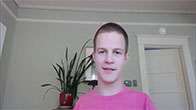 Aug 28, 2019Moderator: Kayla Brown (DO-IT)Supported by: ADEPTMany products and technology are designed without thinking about accessibility and yet people with disabilities are a large market for new devices. In this webinar, we'll hear from a diverse group of people with disabilities about their experiences. They'll talk about technology and tools they use and challenges that they encounter in daily life. We'll explore their perspectives about designing for accessibility and engaging with people with disabilities in the design process.
Aug 28, 2019Moderator: Kayla Brown (DO-IT)Supported by: ADEPTMany products and technology are designed without thinking about accessibility and yet people with disabilities are a large market for new devices. In this webinar, we'll hear from a diverse group of people with disabilities about their experiences. They'll talk about technology and tools they use and challenges that they encounter in daily life. We'll explore their perspectives about designing for accessibility and engaging with people with disabilities in the design process. Aug 14, 2019Cynthia Bennett (UW Human Centered Design and Engineering)Supported by: ADEPTCynthia's work brings stories of design by people with disabilities into the design profession. her motivation was sparked by a contrast she found. Design and engineering materials often present people with disabilities more narrowly as technology users. But through her research and reading Disability Studies scholarship, she has learned that disabled people regularly contribute to design and engineering fields. During the webinar, Cynthia will share a response to this inequity aimed at better recognizing these contributions.
Aug 14, 2019Cynthia Bennett (UW Human Centered Design and Engineering)Supported by: ADEPTCynthia's work brings stories of design by people with disabilities into the design profession. her motivation was sparked by a contrast she found. Design and engineering materials often present people with disabilities more narrowly as technology users. But through her research and reading Disability Studies scholarship, she has learned that disabled people regularly contribute to design and engineering fields. During the webinar, Cynthia will share a response to this inequity aimed at better recognizing these contributions.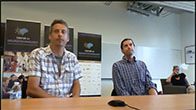 Jul 25, 2019JonSupported by: ADEPTJon, an individual who has received spinal stimulation in an effort to improve movement many years after a spinal cord injury will share his experiences. Discussion focuses on the importance of creating technology and devices that are accessible and usable by everyone!
Jul 25, 2019JonSupported by: ADEPTJon, an individual who has received spinal stimulation in an effort to improve movement many years after a spinal cord injury will share his experiences. Discussion focuses on the importance of creating technology and devices that are accessible and usable by everyone!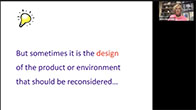 Jun 17, 2019Sheryl Burgstahler (DO-IT)Supported by: ADEPTUniversal design seeks to ensure that products are usable to the widest audience possible, including individuals with disabilities. And yet, universal design and similar design principles such as ability-based design, design for accessibility are not commonly taught in engineering curricula. This webinar introduces the concept of universal design and talks about ways that it could be included in the engineering curriculum.
Jun 17, 2019Sheryl Burgstahler (DO-IT)Supported by: ADEPTUniversal design seeks to ensure that products are usable to the widest audience possible, including individuals with disabilities. And yet, universal design and similar design principles such as ability-based design, design for accessibility are not commonly taught in engineering curricula. This webinar introduces the concept of universal design and talks about ways that it could be included in the engineering curriculum.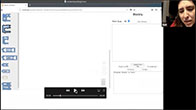 May 09, 2019Stephanie Ludi (University of North Texas)Supported by: AccessCSforAllBlock-based languages are a common way to engage novice programmers, especially children. However, accessibility is lacking. We will present our work in adding keyboard navigation and screen reader support to the Blockly framework to increase accessibility to block-based languages for persons with visual impairments.
May 09, 2019Stephanie Ludi (University of North Texas)Supported by: AccessCSforAllBlock-based languages are a common way to engage novice programmers, especially children. However, accessibility is lacking. We will present our work in adding keyboard navigation and screen reader support to the Blockly framework to increase accessibility to block-based languages for persons with visual impairments. Sep 10, 2018Richard Ladner (UW Allen School)Supported by: AccessComputingExplore how to make the most out of your conference experience. We'll talk about networking, planning your schedule, and talking with potential employers.
Sep 10, 2018Richard Ladner (UW Allen School)Supported by: AccessComputingExplore how to make the most out of your conference experience. We'll talk about networking, planning your schedule, and talking with potential employers.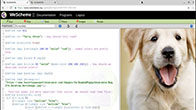 May 30, 2018Emanuel Schanzer (Bootstrap)Supported by: AccessCSforAllLearn more about what Bootstrap, an in-school curriculum and software package that teaches children programming skills, has done to improve the accessibility of their tools used in K-12 education.
May 30, 2018Emanuel Schanzer (Bootstrap)Supported by: AccessCSforAllLearn more about what Bootstrap, an in-school curriculum and software package that teaches children programming skills, has done to improve the accessibility of their tools used in K-12 education. May 17, 2018Tami Tidwell (DO-IT), Michael Reese (RISE Learning Institute), & Sean Marihugh (Microsoft)Supported by: AccessComputingAre you concerned about if, when, and how to disclose your disability in the job search and workplace? Develop your personal plan for how to disclose your disability as you prepare for internships and career jobs.
May 17, 2018Tami Tidwell (DO-IT), Michael Reese (RISE Learning Institute), & Sean Marihugh (Microsoft)Supported by: AccessComputingAre you concerned about if, when, and how to disclose your disability in the job search and workplace? Develop your personal plan for how to disclose your disability as you prepare for internships and career jobs.
